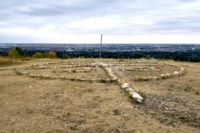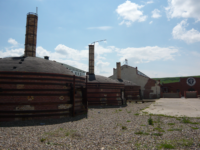When the Ivy Tower is a fishing hole
By Lethbridge Herald on January 12, 2022.
OUR UNIVERSITY
Daniel O’Donnell
One of the great things about being president of the University of Lethbridge Faculty Association (ULFA) is the people you meet.
Normally when you are a professor, you work with people who are interested in the same topics you are. Physicists work with other physicists, historians work with other historians, sociologists work with other sociologists, and people like me, English professors, work with other English professors.
Sometimes you might have a collaboration with somebody in a field that’s close to yours, or work on a project that is interesting to people in a couple of different disciplines. But a lot of times the people you work with do much the same thing you do.
I study the Middle Ages, the Digital Humanities, and how research communication works. Most of the time I work with other people who are also interested in the Middle Ages, Digital Humanities, or Research Communication.
Dr. Lyn Litchkie is not a medievalist. She’s a researcher and teacher in Therapeutic Recreation who came to the University of Lethbridge about a year-and-a-half ago from Texas State University, San Marcos.
Therapeutic Recreation is the study of how recreation can help people living with physical and mental health challenges: physical activities, sports, hobbies, arts… any kind of leisure activity. People who work in this area study how access to recreation impacts different communities and how to make common activities accessible to others, from drumming, to hiking, to fishing.
Lyn has been in Lethbridge only for about 18 months, but she’s already deeply engaged with our community. She has training in tai chi, therapeutic drumming, yoga, therapeutic paddling, and even horticulture therapy. She works with students at the U of L in Recreational Therapy, Public Health, Kinesiology, Biology, Geography, and many other fields.
One really interesting project she is working on looks at how outdoor activities like hiking, paddling, yoga, and fishing can improve the health, quality of life, and social and emotional well-being of people with disabilities, volunteers (U of L students), and their care-givers.
She’s working on this one in collaboration with Dr. Jon Doan of the University’s Department of Kinesiology, and Adaptable Outdoors, a local non-profit organisation.
Last summer this project had U of L students from Therapeutic Recreation, Kinesiology, Biology, Geography, and Public Health working with 22 participants, including children and youth with Down syndrome, cerebral palsy, spinal cord injuries, and amputations, as well as adults struggling with various mental health challenges, including addictions, depression, anxiety, and PTSD.
Participants are able to use special equipment and techniques to go hiking, kayaking, canoeing, stand-up paddling, and fishing.
The study found that even half-a-day in the outdoors led to huge improvements in social and emotional well-being, self-confidence, and renewed life-interest.
This year the project partners are working with Jon and his team to design a special kind of fishing reel that will allow people with physical disabilities to enjoy the sport.
A couple of other projects Lyn is working on involve horses. In one case, she and her students are working with the Lethbridge Therapeutic Riding Centre to measure the impact of horse-riding on health and quality of life for children with disabilities. In the second, the team is working with the Streets Alive Mission and an organisation called Uplift Adventures in the Crowsnest Pass to pair recreational activities like horse-riding in Waterton, tai chi, yoga, meditation, art projects, drumming, and hiking, with a 12-step programme. The goal is to see how recreation can help adults with addictions issues improve their recovery.
A final project Lyn is working on is at St. Michaels. Here, Lyn and her students lead activities like chair yoga, chair tai chi, and drumming for residents in the physical rehab, mental health and long-term care/dementia units.
Dr. Litchkie arrived in Lethbridge just as the COVID pandemic began, and she tells me that she’s yet to teach a class in person. Like a lot of new arrivals, she’s missed those opportunities we used to have in normal times to meet colleagues and students in the hallways and cafeteria.
But that has not stopped her getting out into the wider community and providing both opportunities for our students to gain valuable experience volunteering with local organisations and communities, and helping everybody benefit from enjoying the outdoors and physical activity.
Like so many professors at the U of L, Lyn Litchkie’s “Ivy Tower” is our city, its people, and the mountains and streams that make southern Alberta so special.
Together with her students and colleagues like Jon Doan, she is working to make Lethbridge a better place for all of us.
Our University is a monthly column provided by Daniel O’Donnell, president of the U of L Faculty Association.
23-22




